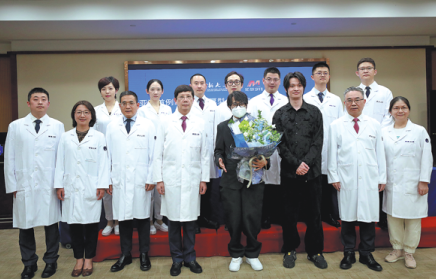Taiwan singer keeps fighting after life-saving surgery in Hangzhou

Renowned singer Tank from Taiwan recently underwent a simultaneous heart and liver transplant to treat a serious genetic condition at the Second Affiliated Hospital Zhejiang University School of Medicine in Hangzhou, Zhejiang province.
Only a handful of medical centers worldwide are capable of performing such operations, often referred to as the Mount Everest of organ transplantation, which requires advanced perioperative management and high-level multidisciplinary coordination.
"I had imagined the worst. But after going through the surgery and recovery, it all feels incredible," Tank posted on Weibo account after being discharged on April 7.
Tank rose to fame in 2006 with his debut album FIGHTING selling over 100,000 copies. His hit songs quickly swept through the Chinese music scene. But in 2007, his sudden collapse on stage revealed a harsh truth — inherited hypertrophic cardiomyopathy had caused his heart muscles to thicken. Following the implant of a pacemaker, doctors warned him that even singing loudly could be fatal, which forced him to step back from his career.
Over the years, he sought treatment at various hospitals but never found a permanent solution. His sister died from the same genetic disease during that period, and just a few months later, his aunt also passed away due to heart-related issues.
In late March 2024, Tank visited the Second Affiliated Hospital Zhejiang University School of Medicine. At that point, his health had deteriorated significantly. Doctors diagnosed him with multiple serious conditions, including hypertrophic cardiomyopathy, decompensated liver cirrhosis and heart failure.
Experts from the transplant center, intensive care unit, anesthesia, internal medicine, radiology and ultrasound departments concluded that due to the coexistence of heart and liver failure, a single organ transplant would not suffice. A combined heart-liver transplant was deemed the only viable solution to save his life.
Understanding the risks and the uncertainty of finding a suitable donor, Tank chose not to waste his time. He spent six days writing 10 new songs and held a concert in Kuala Lumpur, Malaysia. "I also went on tour in Kaohsiung and Taipei (in Taiwan). I felt I had to sing one last time in case I didn't get another chance," he said.
After the tour, his condition worsened dramatically, developing fever and fluid infections. He became unable to stand or eat. By early November last year, both his cardiac and liver function indicators had reached critically risky levels.
The turning point came on Nov 21, when a brain-dead donor gave him the gift of life. Medical teams from the liver transplant, heart transplant and anesthesiology departments as well as ICU and skilled nursing staff, quickly performed the life-saving surgery, which lasted 12 hours.
In the post-operative phase, the team overcame major challenges including delayed graft function, balancing dual immunosuppression and high infection risks.
Referring to the donor, Tank said: "From that day forward, we became one person. I will carry on this boundless kindness for both of us."
On Apr 7, Tank posted on his Weibo: "Today I walked out of the hospital. My body has mostly recovered. Thank you to my motherland, thank you to Hangzhou — for giving me the strongest support in facing the greatest challenge of my life."

Today's Top News
- China urges Japan to stop challenging intl bottom line with its nuclear ambitions
- US arms sales to Taiwan a dangerous gambit: Editorial flash
- Taiwan opposition lawmakers announce plan to impeach Lai Ching-te
- Boosting consumption will be key in 2026
- No one should remain silent accomplice of racism
- Hainan FTP opens fast lane






























